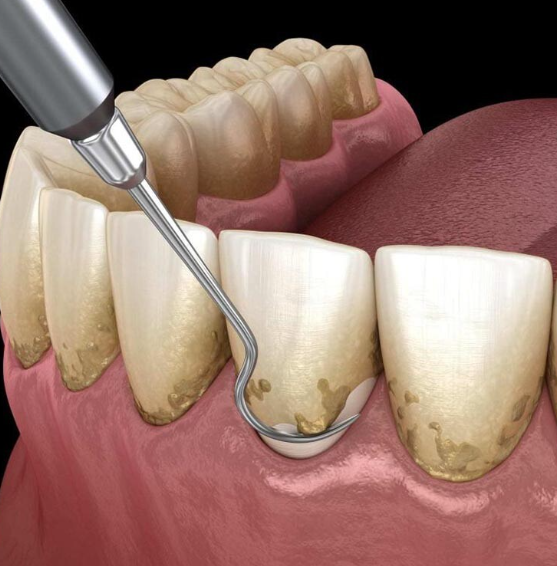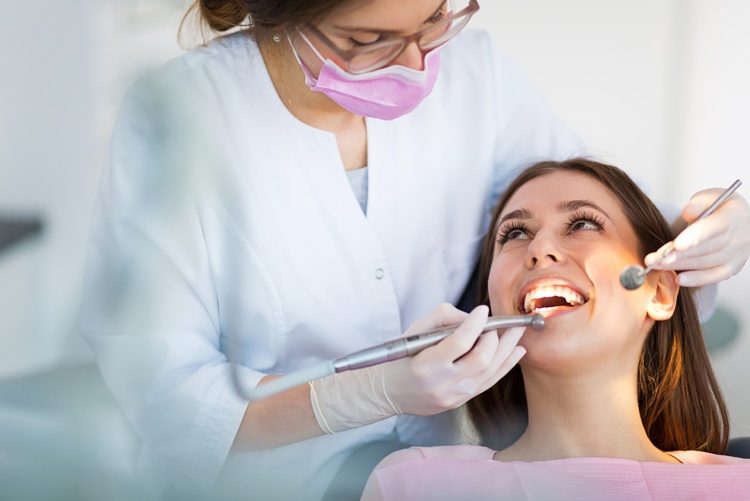
A dental prophylaxis is a thorough teeth-cleaning procedure aimed at maintaining oral health. It plays a vital role in preventing the advancement of periodontal disease and gingivitis.
Periodontal disease and gingivitis occur when bacterial colonies in plaque accumulate on the gum tissue, both above and below the gum line. These colonies lead to severe inflammation and irritation, triggering a chronic inflammatory response within the body. Consequently, the body initiates the systematic degradation of gum and bone tissue, resulting in tooth instability, shifting, or even tooth loss. The deepening pockets between the gums and teeth harbor more bacteria that can potentially travel through the bloodstream, causing infections in other parts of the body.
Why Prophylaxis (Teeth Cleaning) is Necessary
Prophylaxis serves as an effective measure to maintain oral health and hinder the progression of gum disease. Here are some benefits:
Tartar Removal: Tartar (calculus) and plaque buildup, both above and below the gum line, can lead to severe periodontal issues if left untreated. Even with diligent brushing and flossing, it can be challenging to remove debris, bacteria, and deposits from gum pockets. The expertise of a dentist, along with specialized dental equipment, is required to identify and address issues such as tartar and plaque buildup.
Aesthetics: Prophylaxis can restore the teeth to their natural, stain-free glory, enhancing the appearance of your smile.
Fresher Breath: Periodontal disease often results in persistent bad breath (halitosis). This is typically caused by a combination of decaying food particles beneath the gum line, potential gangrene stemming from gum infection, and periodontal problems. The removal of plaque, calculus, and bacteria significantly improves breath and relieves irritation.
Identification of Health Issues: Dentists often identify health problems during prophylaxis, as it involves a comprehensive examination of the entire oral cavity. The dentist can screen for oral cancer, evaluate the risk of periodontitis, and detect signs of medical conditions such as diabetes and kidney problems. Recommendations for adjusting home care routines can also be provided.
What Does Prophylaxis Treatment Involve?
Prophylaxis can be performed during a regular dental visit or, in severe cases of suspected or diagnosed periodontal disease, under general anesthesia. The latter is common to ensure the lungs are protected from harmful bacteria removed from the mouth by placing an endotracheal tube in the throat.

Prophylaxis typically consists of several stages:
Supragingival Cleaning: The dentist cleans the area above the gum line using scaling tools to remove plaque and calculus.
Subgingival Cleaning: This is crucial for patients with periodontal disease, as the dentist removes calculus from the gum pockets and beneath the gum line.
Root Planing: The dentist smooths the tooth roots to eliminate any remaining bacteria, as these bacteria are particularly harmful to periodontitis sufferers.
Medication: After scaling and root planing, an antibiotic or antimicrobial cream is often placed in the gum pockets to promote healing and alleviate discomfort.
X-ray and Examination: Routine X-rays can reveal the extent of bone and gum recession, helping the dentist identify areas that may require future attention.
Prophylaxis is typically recommended biannually for prevention but should occur every 3-4 months for those with periodontitis. While gum disease may not be entirely reversible, prophylaxis is a valuable tool to effectively halt its destructive progression.
Why Visit a Dentist for Dental Cleanings and Gum Treatments?
Many patients seek professional dental cleanings to maintain their oral health. These cleanings are essential for removing plaque and calculus that can accumulate on teeth over time. Plaque, a film of bacteria, adheres to teeth after eating or drinking, and if left untreated, can harden into calculus. This calculus can erode tooth enamel, leading to dental decay. Professional cleanings are essential because they can access areas of teeth that regular brushing and flossing cannot.
Another reason for professional cleanings is gum disease. The bacteria present in plaque can migrate to the gums, causing symptoms such as redness, swelling, bleeding, and sensitivity, indicating the onset of gingivitis. If left untreated, gingivitis can progress to advanced gum disease, known as periodontal disease, which can result in tooth loss and bone damage. Early gum disease treatment is the best way to prevent these serious complications.
Addressing Bad Breath (Halitosis)
In addition to dental cleanings, our practice offers treatments for halitosis (bad breath). Bad breath can result from various factors, including dietary choices, poor dental care, and tooth decay. Chronic bad breath can be embarrassing and affect one's confidence. Our team can provide cleanings, treatments, and at-home oral hygiene recommendations to eliminate halitosis, restoring your confidence.
Importance of Oral Cancer Screenings
Oral cancer is often symptom-free in its early stages, making regular oral cancer screenings crucial for early detection. Detecting oral cancer early increases the chances of successful treatment. Our dentists typically recommend beginning oral cancer screenings at age 18, as part of a routine dental examination.
If you have any concerns about your oral health, including dental cleanings, gum treatments, bad breath, or oral cancer screenings, please reach out to us. We are committed to providing comprehensive dental care and ensuring your oral health. Contact our practice to schedule a consultation and take the first step toward a healthier smile.